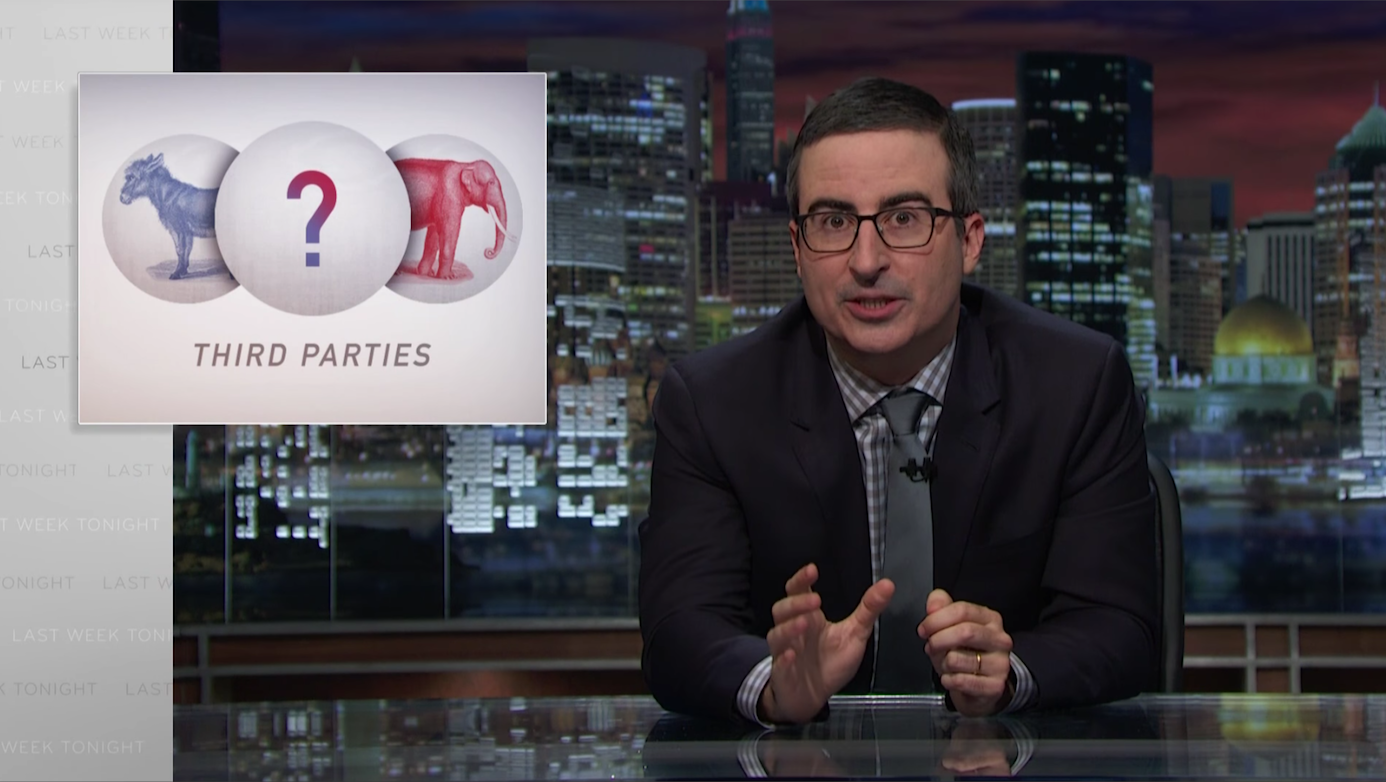
The 2016 presidential election is, as John Oliver put it on Last Week Tonight, "lice on rats on a horse corpse on fire." This is mainly because of Donald Trump's candidacy, but Hillary Clinton's isn't exactly setting the electorate ablaze with optimism for the future, either. The Republican and Democratic nominees' approval ratings are both well below 50 percent, and many Americans are taking a closer look at third-party candidates than they may have in the past. They're probably not finding much to look at, though: As Oliver explains on his show's most recent episode, the candidacies of Jill Stein and Gary Johnson—who are polling at around 2 and 6 percent, respectively—are riddled with more holes than most Americans realize. In other words, the rat-and-lice-infested horse corpse flames on.
Oliver says that there is a lot to like about both Stein and Johnson, and that Americans who are considering voting for them shouldn't be shamed by the #NeverTrump crowd. "While the argument that the only thing that stops Trump is a vote for Hillary Clinton is a powerful one, so is the argument that people should vote for the candidate that most closely shares their values," he says.
Fair point. So let's look into the actual viability of Stein and Johnson not simply as also-rans who exist only to siphon votes from the major-party candidates, but as potential presidents.
Jill Stein
Like Trump, Jill Stein is, for the most part, a political outsider. Her background is in internal medicine, which she practiced for 27 years. She also belonged to an environmentally conscious '90s folk band called Somebody's Sister, a fact that did not escape Oliver's research team and joke writers.
One of the issues with Stein's candidacy is that she has been noncommittal on a variety of issues, including the debate around vaccines and autism, which is bizarre considering her background as a doctor. She's also given credence to 9/11 conspiracy theorists, saying she wants to "bring back" the 9/11 Commission to get the "full story." This isn't a good look.
But Stein's campaign has largely been built around a call to forgive the nearly $1.3 trillion of outstanding student debt. This is an appealing idea, especially to young people, but as Oliver points out, it's not very practical. It's also not clear if Stein understands this. She wouldn't be able to simply "cancel" the debt through "quantitative easing," which is what the government used to bail out the banks. What Stein is proposing, Oliver says, is in essence passing a new law and printing money to enact it, which is not something the president can just do. It's about as improbable as Trump's proposed border wall. Says Oliver: "The only way it could be any more unlikely is if she claimed Mexico was somehow going to pay for it."
Gary Johnson
Then there's Gary Johnson, who despite committing gaffe after gaffe has a good chunk of America interested. He didn't know what Aleppo is; he couldn't name a foreign leader he respects; he oddly talked while holding his tongue in his teeth during an interview with NBC: These are some recent moment that have breached the media's wall of Trump and Clinton coverage, but there are far more reasons to be wary of a Johnson candidacy.
For one, he wants to ax several government departments, including commerce and education, but doesn't seem to understand the implications of doing so. When pressed on the issue by Mark Halperin, he said he supposes these departments did some good things, and that the government would continue to manage some of their current responsibilities after they were cut. "Gosh, you'd have to assume they were doing something that was of value," Johnson said. He failed to offer specifics.
Johnson is also calling to cut income tax in favor of an inflated "consumption tax," which would sit at around 28 percent. On the surface, this is an intriguing, outside-the-box idea, but economists doubt it would actually work. When an interviewer pressed Johnson on the specifics, the candidate complained that the interviewer was getting too "in the weeds." This also is not a good look.
The point is that there simply are no great candidates to vote for in 2016, and while some may feel anyone may seem better than Trump or Clinton, this might not be the case if the alternatives were subject to as much scrutiny as the frontrunners. "The lack of coverage they complain about so much might have genuinely benefited them," Oliver says. "Their key proposals begin to crumble under the slightest scrutiny."
God help us.
Uncommon Knowledge
Newsweek is committed to challenging conventional wisdom and finding connections in the search for common ground.
Newsweek is committed to challenging conventional wisdom and finding connections in the search for common ground.
About the writer
Ryan Bort is a staff writer covering culture for Newsweek. Previously, he was a freelance writer and editor, and his ... Read more
To read how Newsweek uses AI as a newsroom tool, Click here.








